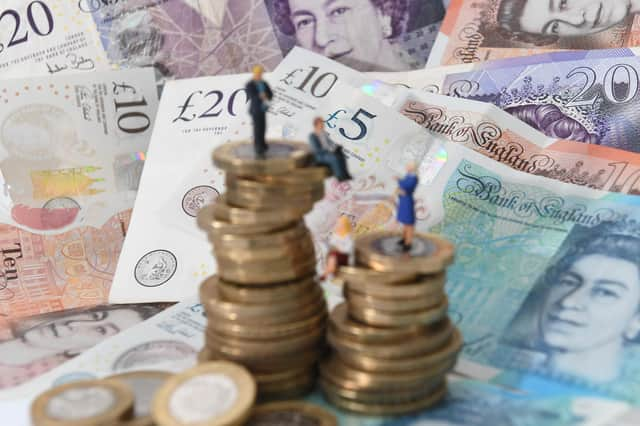Bank of England raises interest rates to fresh 15-year high of 5.25%
The Bank warned of “crystallising” risks which were pushing inflation upwards as it decided to increase its base rate to 5.25% from 5%. It is the 14th rate increase in a row.
But in a good sign for the Prime Minister, the Bank said it expects the Government to meet its promise to halve inflation by the end of the year.
Advertisement
Hide AdAdvertisement
Hide AdThe Consumer Prices Index will probably fall below 5% in the final quarter of 2023, it said.


Bank Governor Andrew Bailey said: “Inflation is falling and that’s good news.
“We know that inflation hits the least well off the hardest and we need to make absolutely sure that it falls all the way back to the 2% target.
“That’s why we’ve raised rates to 5.25% today.”
However, in an unusual three-way disagreement, two members of the Bank’s decision-making Monetary Policy Committee (MPC) voted to hike the rate further, while one wanted to keep it unchanged.
The majority said that some of the risks of more persistent domestic inflation had “crystallised,” a word which the bank used repeatedly through its report on Thursday.
It said that increases in private-sector workers’ wages and other factors which could make inflation more persistent had “begun to crystallise.”
The economy had shown “surprising resilience” over several quarters, and the Bank forecast on Thursday that the UK looked set to avoid a recession.
It said that its interest rates were “weighing on economic activity.”
Advertisement
Hide AdAdvertisement
Hide AdIt said it would if necessary keep the rate higher for longer to try to get inflation down.
Two MPC members, Jonathan Haskel and Catherine Mann, disagreed with the majority and thought that rates should be hiked to 5.5%.
They said that the Bank had repeatedly underestimated how high inflation would remain and that it was “important to lean more actively against inflation persistence.”
“For these members, a forceful increase in Bank rate at this meeting would help to bring inflation back to the 2% target sustainably in the medium term, and to reduce the risks of a more costly tightening later,” the report from the meeting said.
MPC member Swati Dhingra thought it would be better not to change the rate at all.
She argued that the risks of increasing it too far had continued to build and could create a situation where the Bank would be forced to rapidly slash rates in future.
It takes a long time for rate rises to come through, she added.
Indeed a lot of the drop in inflation that the Bank forecast on Thursday came not from the interest rate hikes it has been making since December 2021, when rates were at just 0.1%, but from the drop in energy bills.
Advertisement
Hide AdAdvertisement
Hide AdThe average household is expected to pay less than £2,000 for their energy when the price cap is next changed in October, the Bank’s forecast said.
Outside the Bank on a sunny Thursday morning, a small protest of around half a dozen people gathered to protest against interest rate hikes.
Government set to meet target to halve inflation, Bank of England says
Prime Minister Rishi Sunak will have reason to celebrate on Thursday as the Bank of England forecast that he would meet his promise to halve inflation by the end of this year.
The Bank forecast said that due to drops in international energy prices, inflation is set to fall to around 4.9% averaged over the final three months of 2023.
Inflation was running at 10.7% in the final quarter of last year, meaning that to hit their target ministers would have to hope for inflation, measured by the Consumer Prices Index (CPI, would fall to 5.3%.
But meeting the goal was largely out of the Government’s hands. One of the main tools for combatting inflation is interest rates, which are set by the Bank of England.
And the Bank said that it is largely energy prices, set by global markets, that ministers have to thank for reduced inflation.
The average gas and electricity bill is expected to drop below £2,000 from October when Ofgem next changes the energy price cap, the Bank said.
Advertisement
Hide AdAdvertisement
Hide Ad“CPI inflation was expected to fall significantly further, to around 5% by the end of the year, accounted for by lower energy, and to a lesser degree food and core goods price inflation,” the Bank said.
“Services price inflation, however, was projected to remain elevated at close to its current rate in the near term.”
It added: “Food price inflation, which has a particularly large impact on the living costs of lower-income families due to it making up a larger share of these families’ budgets, remains extremely high.”
But it expects annual food inflation to fall to around 10% by the end of the year as lower input prices make their way down the supply chain.
Though inflation is expected to drop, the Bank does not expect to meet its 2% inflation target for two years, in the second quarter of 2025.
Comments
Want to join the conversation? Please or to comment on this article.
